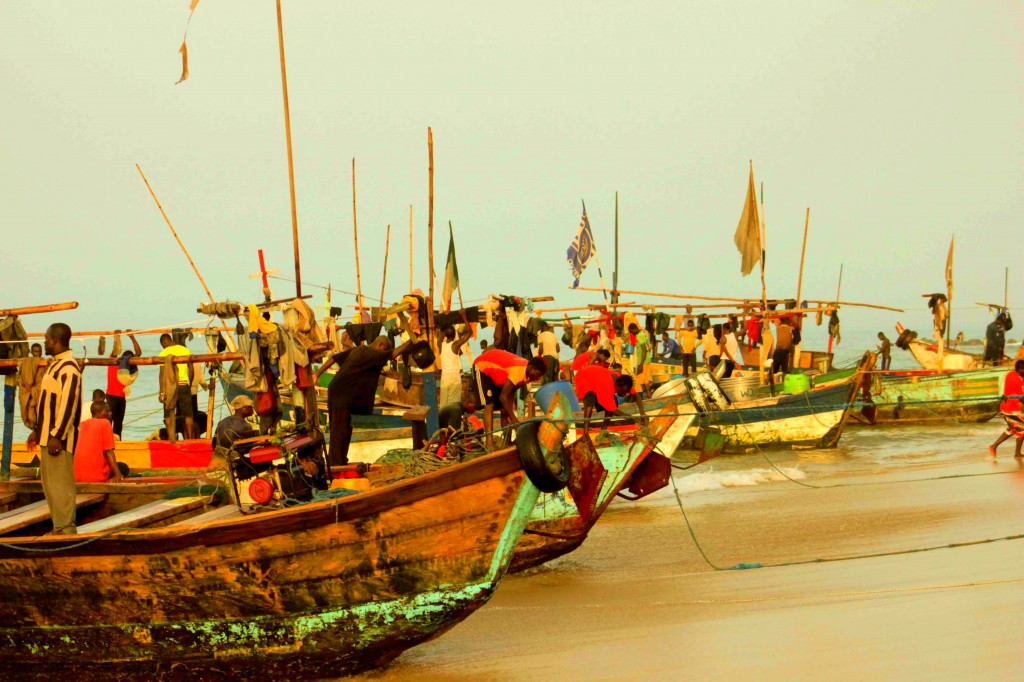By Mebrahtu Ateweberhan, Ghanaian Research Team, 21st Febuary 2012
It is early morning in Miemia Village, Western Ghana. The sky is hazy from the dust of the recent revisit by the Harmattan winds that mingles with the smoke coming from the cooking stoves in local homes. Despite the low visibility and the voice hoarsening dust, the village beach is already alive with the morning bustle. Fisher folks that have been out for a nights fishing are back; fishing boats decorated with the multicoloured flags of nations and football teams around Europe grace the beach, fishermen loudly call seeking the attention of their mates and children scream while learning how to paddle a wooden plank standing for canoe.
 Young men with muscular arms, honed from many years of paddling canoes and pulling heavy nets carry fish between boat and beach in large metallic basins. They ask some of the women standing on the beach where to put down their loads. The bowls have large numbers and signs on them, indicating to whom they belong. As the fish are brought to the beach, the awaiting women assort them by type and size. No scale is used and weight estimates are made by taking a single glance at the fish. Occasionally, a pricy looking fish is taken out from an assortment, and a woman holds it by its tail (caudal fin) and wags it up and down trying to estimate its weight. It must be a unique skill that involves knowledge of fish body type and weight and learned through the experience of many years.
Young men with muscular arms, honed from many years of paddling canoes and pulling heavy nets carry fish between boat and beach in large metallic basins. They ask some of the women standing on the beach where to put down their loads. The bowls have large numbers and signs on them, indicating to whom they belong. As the fish are brought to the beach, the awaiting women assort them by type and size. No scale is used and weight estimates are made by taking a single glance at the fish. Occasionally, a pricy looking fish is taken out from an assortment, and a woman holds it by its tail (caudal fin) and wags it up and down trying to estimate its weight. It must be a unique skill that involves knowledge of fish body type and weight and learned through the experience of many years.
Some of the fish will be passed to middle men and women as fresh, smoked, dried or salted. The country has one of the largest per capita consumption of fish in the world and imports 50% of the 600,000 tonnes consumed. The remaining 50% that is caught locally is distributed to the many cities and townships spread across the country. Every single fish in the streets of towns as far as Tamale, Bolgatanga and Wa must have passed through the hands of one of these women, that link Ghana to the fishermen, the fish and the sea.
Probably the most intriguing aspect in the whole process is who determines the price of fish. I was told that every village has a chief fisherwoman, who coordinates the activity of the other fisherwomen in a village and together they will decide on the fish price of a specific day. It is not clear what reference is used in assigning price to a certain type and size of fish, which requires knowledge of the cost of other common commodities near and far. If true, the role of a chief fisherwoman is fascinating, yet more so is the fact that in a fast developing economy with a complex market network that is greatly influenced by oil booms and gold mining, price of this invaluable commodity to Ghana is determined by some seemingly unassuming women.
What ever the answer is, next time you have a fish on a table in a five-star hotel in Accra or you buy a smoked fish in a village, remember that your fish has changed hands between two important people – a physically strong man and a socially strong woman.
Ekyere!
Miemia, Ghana




